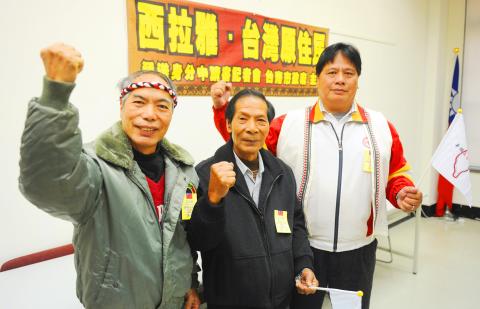|
Siraya Aborigines
call for official tribal recognition
FRUSTRATION: While the Greater Tainan Government
has worked to preserve the tribe’s heritage, the central government has not done
anything, one Aborigine said
By Loa Iok-sin / Staff reporter

Siraya Aboriginal activists hold
up their fists during a press conference in the Legislative Yuan yesterday,
calling on the government to grant them official tribal recognition.
Photo: Lo Pei-der, Taipei Times
Siraya Aboriginal activists, accompanied
by Greater Tainan City Mayor William Lai (賴清德) and a number of Democratic
Progressive Party (DPP) lawmakers, yesterday called on the government to grant
them official tribal recognition.
“We hereby urge the Council of Indigenous Peoples [CIP] to legally recognize the
Siraya as an official Aboriginal tribe, in accordance with the Aboriginal
Identity Act (原住民族身分法) and the Aboriginal Basic Act (原住民族基本法),” Uma Talavan,
spokeswoman for the Tainan Siraya Cultural Association, told a news conference
at the Legislative Yuan. “It’s not only about the pride of the Siraya, it would
also become a shared historic moment for all Taiwanese.”
The Siraya are an indigenous tribe who used to inhabit the Tainan area.
However, the tribe’s culture and language gradually deteriorated after the
arrival of Han Chinese from China in the 17th century because of intermarriages
and cultural assimilation.
Although the Siraya were still recognized as an official Aboriginal tribe by the
Japanese colonial government from 1895 to 1945, it lost recognition following
the arrival of the Chinese Nationalist Party (KMT) in 1945.
Responding to the movement for recognition in the past years, the government
said the Siraya lost recognition as an Aboriginal tribe because they failed to
register as a tribe when urged to do so during the 1950s.
“This is no excuse. Most Siraya people did not receive the notice from the
government to register,” Talavan said. “Besides, our identity is something we’re
born with. The government cannot simply deny it because we didn’t register in
time.”
Cheng-hiong Talavan, father of Uma Talavan, added: “Whatever the government
says, we are Aborigines. The government should give us official recognition.”
Lai said he felt frustrated that while his city government works hard to restore
Siraya culture and language, “the central government is not doing anything.”
He said the city government not only granted official Aboriginal recognition to
the Siraya on the municipal level, it has also given its full support to the
restoration of its cultural heritage and language, including adding the Siraya
language into the educational curriculum of at least three elementary schools.
“When the Dutch colonists brought over the Latin alphabet in the 17th century,
the Siraya created their own Romanized writing system, which is probably the
earliest writing system in the country,” he said.
“Forgetting about the Siraya is like forgetting an important part of our
history. The central government should show its support for the Siraya
movement,” he added.
Shih Cheng-feng (施正鋒), a professor at National Dong Hwa University’s Department
of Indigenous Development and Social Works, panned council officials and some
critics of the Siraya movement for citing loss of language as a reason for not
recognizing the Siraya tribe.
“If you apply the same standards to other officially recognized Aboriginal
tribes, I wonder how many of them could pass?” Shih said. “Many older Aborigines
speak Japanese, while the younger speak Mandarin Chinese. This is a historic
tragedy.”
The activists later delivered an application for Aboriginal recognition to the
council after the news conference.
|
![]()
![]()
![]()